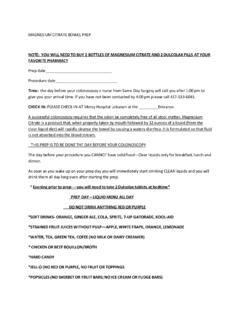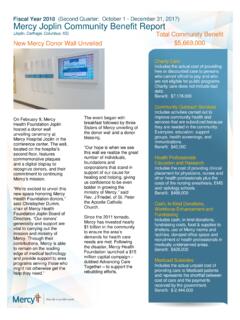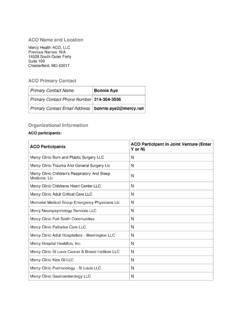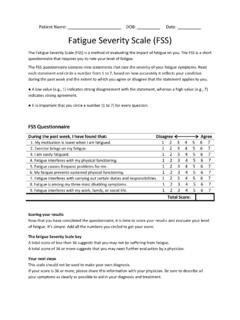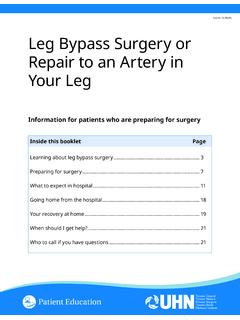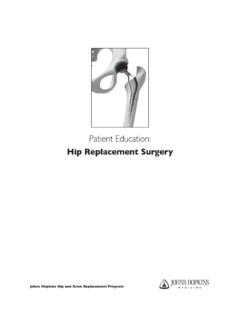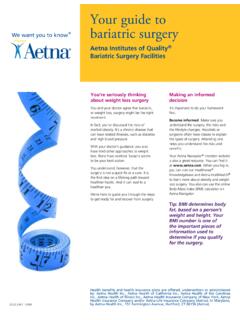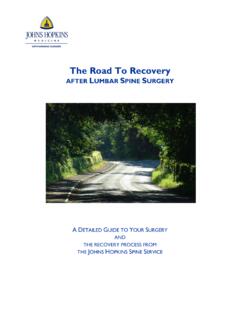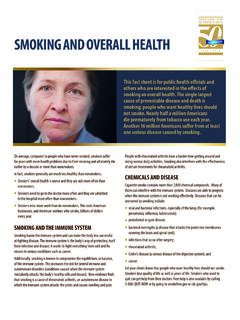Transcription of Quick Nutrition Guide for Bariatric Surgery
1 Quick Nutrition Guide for Bariatric Surgery104 pounds million times happier. Expectations ..4 Surgery and Lifestyle Changes ..5 Supplement Guidelines .. Weeks Pre- Surgery ..8 Post- Surgery Band Fill Instructions ..8 Post- Surgery Stages ..8 Sample Menus ..12 Additional Menu for Limiting Sugary, Greasy, and Processed Foods ..15 Tips For Dining after Surgery ..17 Additional Resources ..18 Special thanks to the University of Mississippi Medical Center, Bariatric Surgery Center for providing educational material for this Surgery , whether it is Vertical Sleeve Gastrectomy or Roux-en-y Gastric Bypass (RYGB), is a life changing procedure. Vertical Sleeve Gastrectomy restricts the amount of food the stomach can hold by creating a thin, vertical sleeve in the stomach. The sleeve is about the size of a banana. RYGB uses both restrictive and absorption-blocking methods for weight loss. By bypassing most of the stomach and part of the small intestine, less area to store food is created.
2 This leads to eating fewer calories and a risk of vitamin deficiencies. Since all surgeries require change to the structure and function of the stomach, it s important that you follow proper dietary stages. What is eaten must be nutrient-dense and well tolerated. Careful planning and daily supplements are required for adequate health maintenance. Bariatric Surgery not only changes eating habits, but requires behavioral changes as well. You need to adjust the amount of food eaten before and after Surgery to help achieve weight loss goals. IntroductionREMEMBER: It s a good idea to read through this Guide several times before Surgery . This will help you feel more confident and education Guide covers several important topics. Basic Nutrition and tips for reducing fat Nutrition expectations prior to Bariatric Surgery Potential complications and their solutions Stages of the post- Surgery Bariatric diet Sample menus Tips for dining out4 Prior to Bariatric SurgeryLifestyle changes are encouraged to improve health before Surgery , help you tolerate Surgery better and provide for a successful recovery period.
3 Permanent lifestyle changes are needed for success after Surgery , which is why it s important to start making changes now. Begin keeping a food log. Record foods and drinks, portion sizes, time, mood, location and hunger level. Include fruits, vegetables, whole grains, lean protein and low-fat dairy to have a well-balanced meal plan prior to Surgery . Limit or eliminate simple sugars and high fat foods. Stop smoking and all forms of tobacco use. Choose only water and sugar-free, decaffeinated, non-carbonated beverages. Drink 48-64 ounces (6-8 cups) non-carbonated, decaffeinated fluids taking very small bites of food and sips of small utensils and small Expectations Begin the day with breakfast to boost metabolism and reduce hunger. Eliminate alcohol. It can cause diarrhea, add excess empty calories, cause metabolism changes (with RYGB) and introduce the risk of addiction. Eliminate carbonated beverages due to their diuretic effect.
4 Excess gas produced can bloat and stretch your pouch. Eliminate straws because they can cause gas due to swallowed air. Eliminate caffeine because it can stimulate appetite, add empty calories and cause diarrhea. Practice taking very small bites/sips of foods and beverages (use small utensils and small plates). Chew foods thoroughly (30 times) to the texture of applesauce before swallowing. Practice eating and drinking very slowly. Take at least 20-30 minutes to finish eating a meal. Set fork down between bites of food to slow eating pace. Practice not drinking with meals: See section on sugar and lifestyle changes. The doctor will require a full liquid diet two weeks prior to Surgery to shrink the liver. Attend support group meetings and educational sessions to prepare for Surgery . Manage blood , Bariatric Surgery is a tool that helps make the necessary lifestyle changes for weight loss. It doesn't guarantee lifestyle changes.
5 The Surgery makes the stomach into a small pouch. The new pouch, along with behavior changes, helps with portion control. Below are helpful rules to make the tool work. If the rules and other dietary guidelines in this Guide aren't followed, complications or problems can occur after Surgery . Rules for Weight Loss:Useful Tools for Weight Losssurgery performed. It may also cause vomiting. Eat slowly and chew food thoroughly. If a meal is eaten too fast it may become hard to feel satisfied before it's too late. This may lead to overeating, vomiting or possible blockage. Do not drink with meals. Drinking will flush food quickly through the pouch and/or lead to overeating at meals. Avoid drinking fluids 10-15 minutes before meals (sleeve patients may drink up to the meal). Also avoid drinking during meals and 30-60 minutes afterwards. Surgery and Lifestyle ChangesExercise regularly; or as recommended by the physician or exercise physiologist.
6 Do not drink liquids with calories except for milk and protein drinks. Liquids that contain calories include regular soft drinks, sports drinks, sugary fruit drinks, sweet tea, and coffee with sugar. Fruit juices have calories, but in small amounts can also provide vitamins and minerals. If fruit juices are desired, choose 100% fruit juice and limit the serving size (4 oz. is considered a serving of juice). Avoid caffeinated, carbonated, and/or alcoholic beverages. This includes coffee, tea, bubbly drinks and any alcohol. Always eat the protein source first at meals. This will help you get the required protein recommendations. Choose healthy, nutrient-dense foods. The quality of food you eat is more important after Surgery because the amount is much smaller. Take all necessary supplements daily; see Supplement Guidelines: and Vitamins, pp. 6-7. Exercise regularly or as recommended by the physician or exercise physiologist.
7 Eat three meals a day and one or two snacks (if needed). Snacking too much between meals adds extra calories. This will slow weight loss, cause weight regain, or result in a weight loss plateau. When used wisely, snacks can help you meet your protein goals and can control hunger between meals. Always stop eating or drinking as soon as you feel satisfied. Eating past the point of fullness will cause the pouch to stretch/slip depending on 6 Protein The following protein drinks, bars and other products can be used to help you reach 60-80 grams of protein daily. The following supplements may be found at area stores or ordered online. See guidelines for choosing GuidelinesGuidelines for Choosing Supplemental Protein Sources: Nutrition Facts Serving Size 1 Cup (228 g)Servings Per Container: 3 Amount Per ServingCalories 90 Total Fat 3 gCholesterol 0gSodium 300 mgTotal Carbohydrate 10gDietary Fiber 3gSugars 3gProtein 30 gVitamin A 80%Vitamin C 60% Calcium 4%Percent Daily Values are based on a 2,000 caloriediet.
8 Your daily values may be higher or lowerdepending on your calorie needs: To tal FatLess than65g80gCalories2,0002,500 Sat FatLess than20g25gCholesterolLess than300mg300mgSodiumLess than2,400mg2,400mgTo tal Carbohydrate300g375gDietary Fiber25g30gIron 4% Saturated Fat 0g5%0%0%13%4%12%22%Calories from Fat 30As Served% Daily Value High Protein Drinks and Shakes: EAS Carb Control drinks and whey powders GeniSoy Products: MLO Super High Protein powder, MLO Brown Rice Protein powder, MLO Milk and Egg Protein powder, MLO Vegetable Protein powder UNJURY Protein powders and broth for Bariatric Surgery patients Optimum Protein Diet Shakes Bariatric Fusion Protein Supplement Bodytech Whey Pro 24 Premier whey protein powders or ready to drink 1st Phorm Level-1 Zero Carb Isopure powders and drinks and Perfect Whey Protein powder Pure Protein whey powders Garden of Life raw proteinHigh Protein Bars: GeniSoy Low Carb Crunch Bars Slim Fast High Protein Meal Bars Premier protein bars Quest protein bars Unflavored High Protein Powders: Beneprotein GeniSoy Ultra XT Soy Protein UNJURY unflavored protein powder for Bariatric Surgery patients GNC Pro Performance 100% Whey Protein drinks and shakes: 20-35 grams protein per serving.
9 Milk can be used with powdered protein to increase the total protein value. Protein bars: 10-20 grams protein per serving Total fat: five grams or less per serving Total carbohydrates: 10 grams or less per serving Products should be low in sugar, five grams or less per serving7 Because you're eating smaller amounts of food after Surgery , getting enough vitamins may be difficult. Multivitamin: All Bariatric patients For specific brands, dosage and frequency, see a dietician for a current list. Avoid taking multivitamins at the same time as calcium to avoid absorption problems. Do not take gummy vitamins. Do not take a 50 plus citrate with Vitamin D: Most Bariatric patients Take two or three per day (at least 1000mg/day); no more than 600mg at a time, separately from multivitamin. Calcium Citrate is best absorbed for both Surgery types. Vitamin B12: All Bariatric patients Sublingual Vitamin B12: 1000 mcg twice weekly OR Intramuscular injection of B12: 1000 mcg per month (must be prescribed by MD)Vitamins It is recommended that all Bariatric patients take some form of vitamin supplement after Surgery .
10 Chewable or liquid supplements are absorbed best. Biotin: Most patients 1000 mcg per day REMEMBER: Herbal supplements are not recommended because they can interfere with some medications and may have blood thinning properties Sample Vitamin Regimen: 7:30 Chewable Calcium10 Chewable Vitamin and B12 (if needed)1 Chewable Calcium4 Chewable Vitamin7 Chewable Calcium and Biotin8 Liquid DietWhy is this necessary? The two-week liquid diet is to decrease the size of the liver before Surgery . This makes it easier to do the operation because the liver can block access to the stomach. If the liver is too large, the Surgery may be postponed and the full liquid diet attempted again. Your compliance with this diet is important to make your Surgery as safe and successful as possible. Week 1: Replace two meals a day with approved liquids. Some programs allow a small meal of solid food as well. Talk to your dietitian about your 2: All meals are liquids only.

